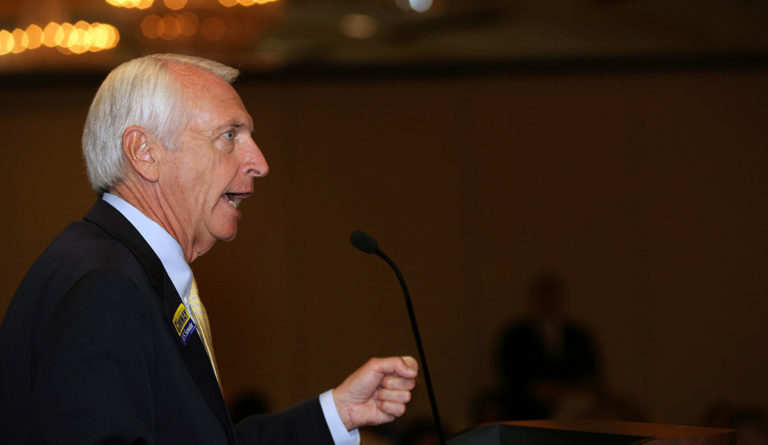ACA Politics: Lessons from Kentucky
Steven Beshear, former Governor of Kentucky, the state that most aggressively embraced and succeeded in implementing the Affordable Care Act as a core part of a holistic strategy to improve its collective health, suggests putting partisan fervor aside.

Read Time: 7 minutes
Published:
I’m the former Governor of Kentucky, the state that most aggressively embraced and succeeded in implementing the Affordable Care Act as a core part of a holistic strategy to improve its collective health. It’s also the state that for the past year has been watching my Republican successor starting to dismantle that strategy for no reason other than he can. So I have a message for Republicans in Washington who are giddy about the prospect—after years and years of trying—of finally repealing the ACA, the transformative program most closely affiliated with the eight-year administration of President Barack Obama: Step back and think about the people you’re elected to represent .
See, with all the ideological chest-thumping and rabid partisan rhetoric, with all the crowing about the political coup of gaining control of the White House and both chambers of Congress and what it will allow the GOP to do … not enough attention is being paid to the people who have the most to lose with this decision: the over 20 million Americans who currently have health coverage only because the ACA took an innovative approach to one of the most stubborn and damaging challenges in modern era—the lack of access to affordable health care.
What comes next for these Americans?
Unfortunately, no one knows and too few leaders seem to care.
Most of the “repeal and replace” talk—including from Kentucky’s own GOP delegation—over the years and even now continues to center on the “repeal,” with little serious consideration being dedicated to the far more complex problem of the “replace.” With decisions rooted firmly in ideology and political gain, the impact on actual families has been almost an afterthought.
The same reckless disregard has been true in Kentucky.
These people would get up every morning, go to work and roll the dice, hoping and praying that they didn’t get sick. They chose between food and medicine. They ignored checkups that would catch serious conditions early. They put off doctor’s appointments, hoping a lump or a pain turned out to be nothing. And they lived every day knowing that bankruptcy was just one bad diagnosis away.
I embraced the ACA for one simple reason: Kentucky’s collective health had long been terrible, and what we’d been doing for generations wasn’t working. In almost every measure of health there was, Kentucky ranked near the bottom or at the bottom and had for a long time. The suffering was deep. Kentuckians were sicker than most. We died too early. And our families were going bankrupt paying to treat diseases and chronic conditions.
Our poor health also had devastating consequences for our state as a whole, as there was and remains a direct line between poor health and almost every challenge Kentucky faces—whether that’s poverty, unemployment, lags in education attainment, substance abuse or crime.
Now, one of the biggest reasons for our poor health was lack of access. Before we expanded Medicaid eligibility and created our own state-based Health Benefit Exchange, an estimated 640,000 people in Kentucky were uninsured. That was almost one in six Kentuckians – putting both their health and financial security in jeopardy.
These people would get up every morning, go to work and roll the dice, hoping and praying that they didn’t get sick. They chose between food and medicine. They ignored checkups that would catch serious conditions early. They put off doctor’s appointments, hoping a lump or a pain turned out to be nothing. And they lived every day knowing that bankruptcy was just one bad diagnosis away.
Look, some politicians believe that these people are not deserving of health care because they’re poor, or because they work for an employer that doesn’t provide health care or it’s priced out of reach. They talk about them as if they are from some distant planet.
But they’re not. They’re our friends and neighbors. Our former classmates and hunting buddies. We sit in the pews with them on Sunday and in the high school bleachers with them on Friday night.
The Affordable Care Act gave us an opportunity to address this big problem in an aggressive way.
And so—after consulting independent analysts who told me that yes, Kentucky would come out financially ahead if we did so—I moved forward.
The result was phenomenal.
In early 2016, a Gallup-Healthways survey measured Kentucky’s uninsured rate at 7.5 percent, down from more than 20 percent before the ACA.
And even though better health outcomes tend to lag a few years behind health policy changes, a study by researchers at Harvard’s School of Public Health published in JAMA Internal Medicine in August 2016 found that already, low-income Kentuckians reported being in better health and were more likely to have a doctor, to have their chronic disease or condition treated and to have been screened for things like high blood sugar and high cholesterol, which are important in treating heart disease and diabetes.
As for the effect on taxpayers and the state as a whole, a study in 2015 conducted by Deloitte Consulting and the University of Louisville Urban Studies Institute using hard data from our first year of expanded Medicaid, found that expansion generated 12,000 new jobs and $1.3 billion in new revenues for providers (increasing to almost $3 billion in the first 18 months of expansion). It also projected a $300 million positive impact on the state’s 2016-18 annual budget and the creation of 40,000 new jobs and a $30 billion overall economic impact through 2021.
There is a mountain of evidence demonstrating the success of the ACA in Kentucky.
But that didn’t stop our newly elected governor, Matt Bevin, from claiming both that the ACA was not financially sustainable and that it wasn’t having an impact on health.
He has no evidence, just ideology. In fact, he refuses to address all the evidence staring him in the face. Instead, he just says that low-income Kentuckians need to have “more skin in the game” and insists that making care harder to access will somehow make Kentuckians healthier.
Recently he dismantled Kentucky’s exchange, called “kynect,” and moved to the federal insurance portal, needlessly complicating the process and destroying what was hailed as the nation’s most successful and simple exchange. Many advocates predict that enrollment numbers will drop.
He also has applied for a Section 1115 waiver to administer Medicaid expansion, with the primary goal of saving money. By his projections, the waiver would save money, but only by cutting 88,000 people from eligibility rolls; eliminating vital benefits like dental, vision, and medical transportation; and imposing onerous administrative barriers like work requirements for eligibility, monthly premiums that increase the longer one is poor, lockout periods for not enrolling on time, and retroactive fines for emergency room visits later determined to be non-emergent.
Medical professionals have warned that these steps will reduce enrollment and access and hurt care. Families and their advocates across the state used public comment periods to voice their outrage and anxiety.
But the criticism has only strengthened the governor’s resolve. Even though parts of the waiver application run contrary to the goals of Medicaid and the waiver program (which should make the application impossible for the federal government to approve), Gov. Bevin has threatened repeatedly to get rid of expansion altogether if his waiver isn’t approved as written.
That would strip health coverage from 400,000 vulnerable Kentuckians with a stroke of a pen.
Again, it seems that ideology is more important than the fate of actual families.
I fear the same result in Washington on a national scale.
This isn’t about President Obama but about American families. And while there are some issues with the ACA that need to be addressed, there is also undeniable proof that it has strengthened this nation at its core.
That’s why I urge our leaders to take a deep breath, let the reckless partisan fervor subside and ask themselves: What will happen to the 20-plus million Americans who have been put on the path toward hope and better health?
Featured Image: Kentucky Democratic Party, Governor Steve Beshear, used under CC BY-NC 2.0



